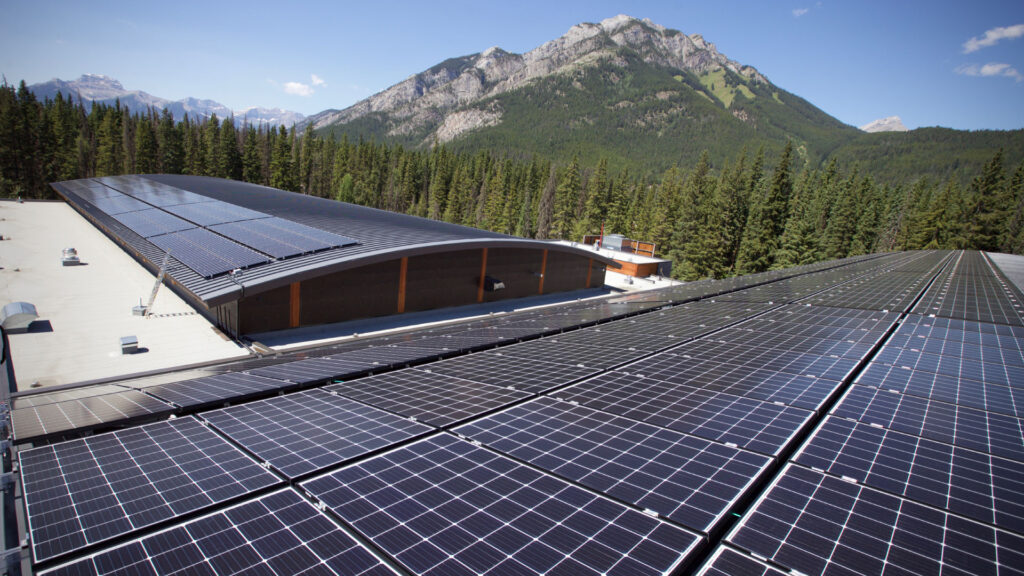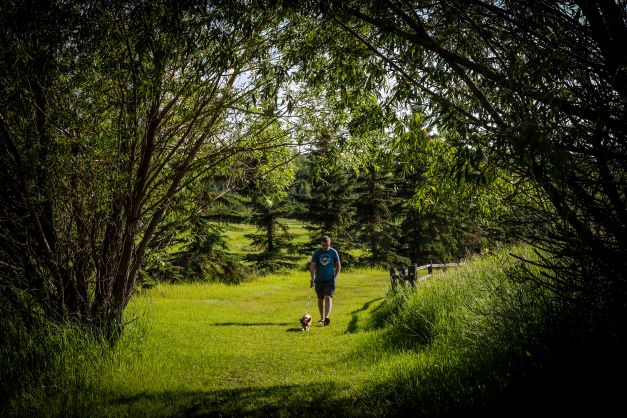Located in Banff National Park, the Town of Banff is a popular tourist destination and a place where adventurers live and play. They work closely with Parks Canada to protect wildlife and ecosystems for the enjoyment of their community and all Albertans.
To address climate mitigation and emissions reduction, Banff is actively implementing their Environmental Master Plan on both a corporate and community scale, so they can lead an exemplary business and empower their citizens to act on climate change.
The Partners for Climate Protection Program supports municipal action on climate change by guiding members, like the Town of Banff, through a five step milestone framework to create lasting sustainable changes.
From creating a baseline emissions inventory, to setting and reaching emissions reduction targets, each step moves municipalities closer to achieving their goals. The milestone framework includes the following steps:
- Create a Baseline Emissions Inventory and Forecast
- Set Emissions Reduction Targets
- Develop a Local Action Plan
- Implement the Local Action Plan
- Monitor Progress and Report Results
The Action Centre recently spoke with Michael Hay, Manager of Environment & Sustainability, at the Town of Banff to learn about his experience in the program and explore examples of their climate achievements and challenges.
Watch: The Town of Banff discuss how they monitor and measure climate progress.
Banff’s key plans, projects and results
Michael outlined the various plans, policies and projects the Town of Banff is implementing on their road to a sustainable future.
The plan establishes a 10-year strategic vision to a sustainable future for Banff, adopted by council as a guiding document in 2019.
Renewable Energy Transition Roadmap
A technical blueprint providing a pathway for the Town on Banff’s ambitious climate goals. The plan targets a low carbon scenario, organized into four focus areas (energy efficient buildings, local low-carbon energy, importing renewable energy, and low-carbon transportation) and the 30 actions needed to get there.
Municipal Sustainable Building Policy
A corporate policy that sets the standard for all new municipal buildings to meet or exceed the Silver Level certification of the Leadership in Energy Environmental and Design (LEED™) Green Building Rating System.
The Town hired a staff member to guide their facility energy assessments, identify energy saving opportunities, and implement GHG emission reduction projects.
Tip: The Municipal Energy Coordinator position is funded by the Action Centre’s Municipal Energy Manager Program, which covers 80 per cent of the salary costs to hire a staff member dedicated to energy work.
Community Engagement
The Town offered environmental rebates and incentives to both Banff businesses and residents. Citizens can access information for energy and water conservation from the Town’s website.
A mass transit option is offered to reduce emissions from the transport sector with a local and regional (Banff-Canmore-Lake Louise-Moraine Lake-Johnston Canyon) bus system (ROAM Public Transit). Sustainable transportation is further promoted with connected bike lanes/trails, a studded bike tire rebate, and Banff Bike Month in June.
The Town of Banff has invested in solar photovoltaics at several municipal buildings including these locations:
- Waste Transfer Station – 100kW system, projected to generate 95,000 kWh of clean electricity
- Fenlands Recreation Centre – 280 kW system, projected to reduce energy bills by approximately $15,000 per year.
- Transit-Fleet Buildings – 24kW system that has, to date, saved 19.2 tonnes of CO2e emissions which is equivalent of planting 573 trees
- Banff Town Hall – 18 kW system, that also inspires local businesses and residents to consider installing their own solar powered systems.
Upcoming Climate Action Projects
- District heating system using biomass fuel source.
- Electric buses for local / regional bus system.
- Proposals for increased mass transit options from Calgary.

Advice from Banff: Takeaways on Monitoring, Measuring, and Reporting on Climate Action
Michael offered these four takeaways that every municipality should consider when monitoring, measuring, and reporting on climate action.
- Identify gaps and continue collecting data
- Keeping and analyzing records for natural gas and electricity consumption are essential activities.
- High-quality transportation emissions data can be challenging to collect. Consider investing in data collection tools like traffic counters and pedestrian / trail counters or purchasing retail fuel sales data. Census data is useful for mode-share calculations.
- Completing an inventory can highlight where you are meeting targets.
- Track GHG increases as well as decreases
- Project-level emission tracking often focuses on measuring reductions, which can lead to emission increases being overlooked.
- Understand how external factors (population change, density change, etc.) impact your emissions.
- Understand the Alberta electricity grid and how the emission factors associated with electricity impact your emissions and inventory.
- Allocate staff time for energy management
- If your inventory indicates the primary source of emissions is related to energy consumption, invest in energy management practices.
- Strong energy management practices require robust tracking of all corporate facilities, vehicles, and equipment.
- Stick to a reporting schedule
- For corporate emissions, Banff reports annually to Town Council, and updates internal records monthly.
- Keep track of energy projects that might be displacing grid electricity or natural gas (solar, biomass, cogeneration).
- Normalize emission tracking for council and senior management.

Ronak Patel
Program Lead – Capacity Building
Working with Alberta Municipalities’ Sustainability Services, Ronak is supporting communities taking action on climate change.


You must be logged in to post a comment.